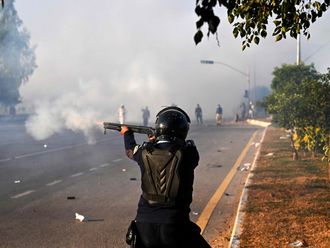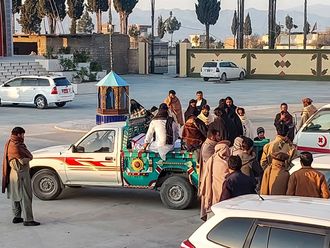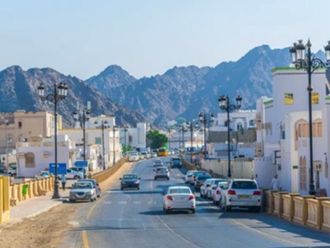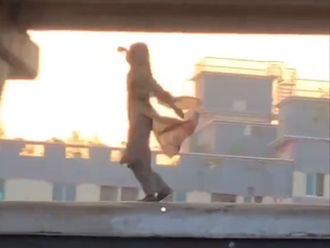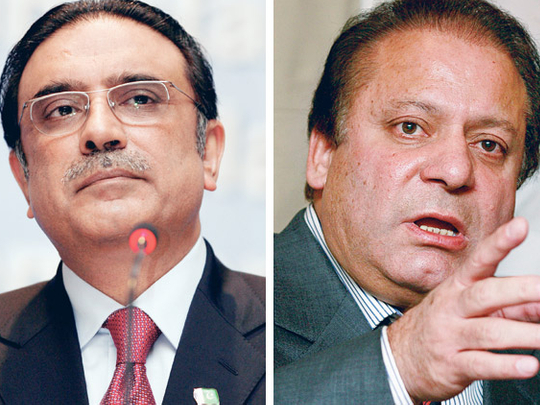
Islamabad: Pakistan's politics have never been for the timid. Its politicians seem to relish brinkmanship and regularly lurch from crisis to confrontation and back.
At the heart of Pakistan's latest crisis is an amnesty law that allowed the current crop of politicians to return after years of exile but which was thrown out in December 2009 by the Supreme Court.
The Supreme Court will rule on a government appeal against the overturning of the amnesty law today.
A court rejection of the appeal, which is likely, could open the door to attempts to prosecute government leaders, including perhaps, President Asif Ali Zardari.
At stake could be the presidency, the country's democratic system and possibly the United States' global struggle against Islamist militants.
The main players
Pakistan has never lacked for colourful politicians.
n President Asif Ali Zardari, also the head of the Pakistan Peoples Party (PPP) and widower of former Prime Minister Benazir Bhutto, who was assassinated in December 2007 after she returned from self-exile.
n Chief Justice Iftikhar Mohammad Chaudhry, head of the Supreme Court, is Zardari's main opponent. Supporters say he is trying to clean up Pakistan's culture of corruption and enshrine the rule of law. Critics say he is a cats-paw for opponents of Zardari and the PPP and is bent on bringing down the president.
n Nawaz Sharif, opposition leader, former prime minister and head of the Pakistan Muslim League-Nawaz faction, has been a rival to the Bhutto dynasty since the 1990s.
n Chief of Army Staff General Ashfaq Kiyani is the most powerful man in Pakistan. As head of the army and holding the reins on foreign policy and national security, Kiyani is an enigmatic and silent figure who says he wants no part for the military in politics.
Legal and political issues
In addition to the government's appeal, there are several outstanding corruption cases against Zardari in Switzerland involving accusations of money-laundering. The cases were withdrawn in 2008 after Zardari was elected president. Government ministers, officials and Prime Minister Yousuf Raza Gilani — all members of the PPP — often say the government cannot seek to reopen cases against Zardari because he enjoys presidential immunity, provided by Pakistan's constitution.
Zardari is also vulnerable to legal challenges to his 2008 election as president on the grounds that other corruption charges, in addition to the Swiss cases, against him made him ineligible to stand for office.
What happens if he is forced out?
It could upend Pakistan's political system and give ammunition to Sharif, who has already made public his support for the judiciary in case of a confrontation.
There would likely be a no-confidence vote against the government of Gilani, which could force new elections that could propel Sharif back into the prime minister's seat.
Pakistan's allies including the United States believe any political crisis in nuclear-armed Pakistan would distract the government's attention from its efforts to crush militants who are fighting an insurgency on the both sides of Pakistan's lawless border with Afghanistan.
What can be done to stop this?
Kiyani is apparently trying to defuse the tension between the government and the judiciary which comes as the country is struggling with the aftermath of big floods and a Taliban insurgency, analysts say.
"The establishment is not happy with Zardari but it will not go to the extent that the judiciary throws him out," political analyst Hassan Askari Rizvi said.
With the military in a position of strength after its well-received response to August's devastating floods, analysts say there's no desire on the part of the top brass for a military coup. The army, which has ruled for more than half of the country's history, feels it's better to let the civilian government take the blame for its poor flood response, and then leverage that unpopularity for more internal influence.
The government "will do whatever the army wants, so that's why they don't want to knock him out, but to keep him under pressure", Rizvi said of Zardari.




